Thanks for your support! If you make a purchase using our links in this article, we may make a commission. And, as an Amazon Associate, I earn from qualifying purchases. See the full disclosure here.
The RV industry is huge and continuously growing. And with that growth comes the growth of the RV rental and RV sharing sector. But is RV Sharing Worth It?
While plenty of companies offer RV rentals to curious customers, ordinary motorhome and travel trailer owners can take advantage of this trend to make money.
Enter RV sharing: renting your RV to vacationers, road-trippers, and RV-curious folks is the increasingly popular way to make money with your RV.
In this article, we’re taking a deeper look at RV sharing, including:
- How it works.
- How much money you can make.
- Where to rent your RV.
- And much more.
Let’s get started.
What is RV Sharing, and Why Is It So Popular?

RV sharing lets other people rent your personal RV (for a fee) that want to take an RV vacation or experience the RV lifestyle. It’s like Airbnb for RVs.
When you aren’t using your RV, you can rent it out to vacationers to make extra money and ‘exercise’ your RV. This type of arrangement is also known as “peer-to-peer RV rental.”
Peer-to-Peer RV Renting Explained
Peer-to-peer RV renting is an RV owner renting their RV directly to another individual.
This type of RV sharing has allowed the RV industry to explode. Additionally, it gives renters the option to experience many different RVs instead of the cookie-cutter RVs offered by many big rental companies.
Peer-to-peer services aren’t just limited to the RV industry. However, you’re probably familiar with Airbnb, Uber, VRBO, or Lyft. These services involve an owner sharing their property to transport or accommodate another individual.
Although you can choose to rent your RV out yourself using local marketplaces, it’s much easier and more profitable to list it on an online marketplace.
There are many benefits of listing with an online peer-to-peer rental marketplace. Most notable, though, is the exposure to thousands upon thousands of prospective renters browsing the established marketplace.
In addition, there are lots of platforms you can use to rent out your RV, and you can use one or all of them at the same time. Why list your RV on just one website platform when there are other great choices, such as Outdoorsy, and RVezy.
What makes RVShare the Best?
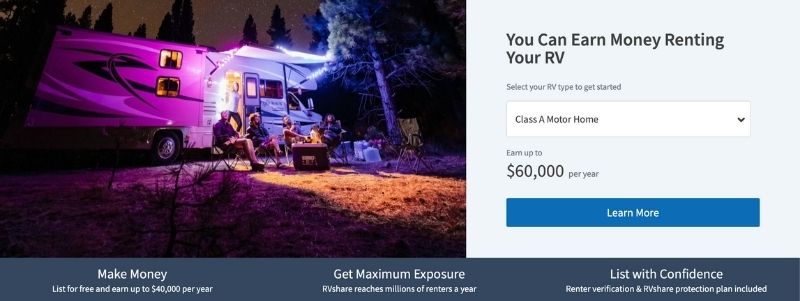
RVShare is the largest peer-to-peer RV rental marketplace on the internet today.
Since it’s the largest peer-to-peer RV rental marketplace online, over 60,000 thousand potential renters are browsing the platform. That means more opportunities to get eyes on your listing and an increased chance of rental.
But that’s not the only reason that RVShare is great for owners. Here are some of the top benefits of listing with RVShare.
Benefits of Listing Your RV With RVShare
- Free to join for RV owners.
- Owners can earn up to $40,000 per year on average renting with RVShare.
- RVShare has tons of owner resources to help you make the most money possible.
- Insurance coverage is built-in.
Sign Up to List Your RV with RVShare Free Here.
What Type of RV is the Most Rented?
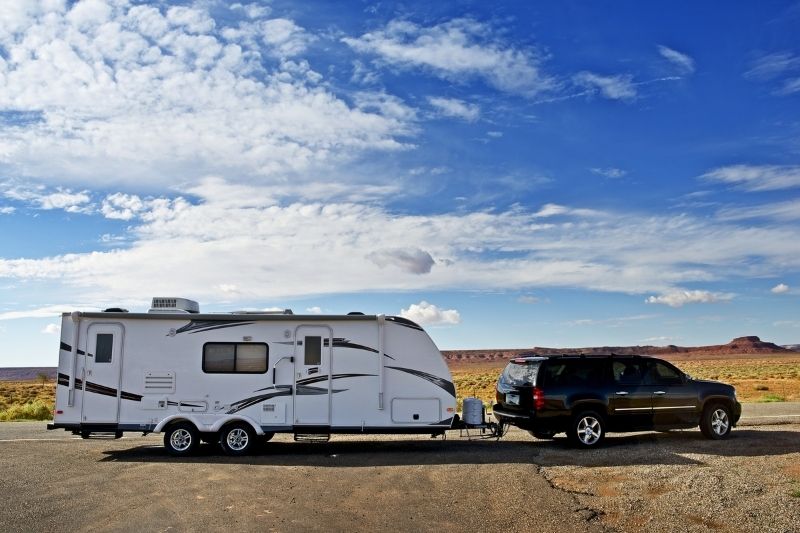
According to a recent RV Renters Association (RVRA) study, an RV Dealers Association (RVDA) division, travel trailers are the most popular RV rental type, followed by Class C motorhomes.
In their survey, the RVRA found that travel trailers were the leading type of RV rental with a 52% lead, followed by Class C RVs at 34%.
“Because pickup trucks and SUVs capable of towing many travel traielrs are some of the most popular vehicles in North America, it’s no surprise that towable RVs are popular with renters.”
Scott Krenek, Chairman of RVRA
Although these are the most popular types of RV rentals, that doesn’t mean that renting out your Class A or B motorhome or fifth-wheel trailer won’t be profitable.
In fact, in a more recent travel trends study conducted by RVShare, 77% of respondents said they would be more likely to take an RV trip if the RV was delivered to their destination.
And guess what? As an owner, you can do that.
Whether you’re uncomfortable with the prospect of a stranger driving or towing your RV or just want to offer more options to prospective renters – you have full control.
Do I need RV Rental Insurance?

Yes, you do need RV rental insurance. And your auto insurance company like Geico will not cover your RV if you rent it out. RVShare offers insurance coverage for RVs rented through their platform, but there’s more you should know.
RV Rental Insurance for Owners
As an RV owner, you need two types of RV insurance. They are:
- Your traditional RV insurance policy covers you and your RV.
- An additional RV insurance that covers your RV during the rental period.
As an owner listing your RV with RVShare, you have access to a free Protection Plan that you can activate by listing it on RVShare. It comes with the following:
- Up to $1m in liability coverage.
- Up to $300k in comprehensive and collision based on your RV’s value.
- Campsite liability coverage up to $10k.
- Free 24/7 roadside assistance.
While you can certainly purchase insurance for your RV through RVshare, we highly recommend checking out Roamly for your RV insurance. They are one of the only RV insurances that will cover your RV if you rent it out, and their rates are very good.
You can learn everything you need to know about RV rental insurance in our article titled: The Wrong RV Rental Insurance Leaves You Exposed.
RV Rental Insurance for Renters – Third Party Liability
In addition to having your own RV insurance that covers you and your RV during and outside of the rental period, the renter will also need insurance coverage for the rental period.
The insurance carried by the renter is called third-party liability. This policy covers their property, medical needs, and the damage they cause to your RV while they have your RV.
RVShare has a standard package of insurance that automatically applies when a renter books your RV.
Renters also have the opportunity for upgraded coverage at the time of booking.
Learn more about RVShare’s rental insurance here.
Is RV Sharing Profitable?
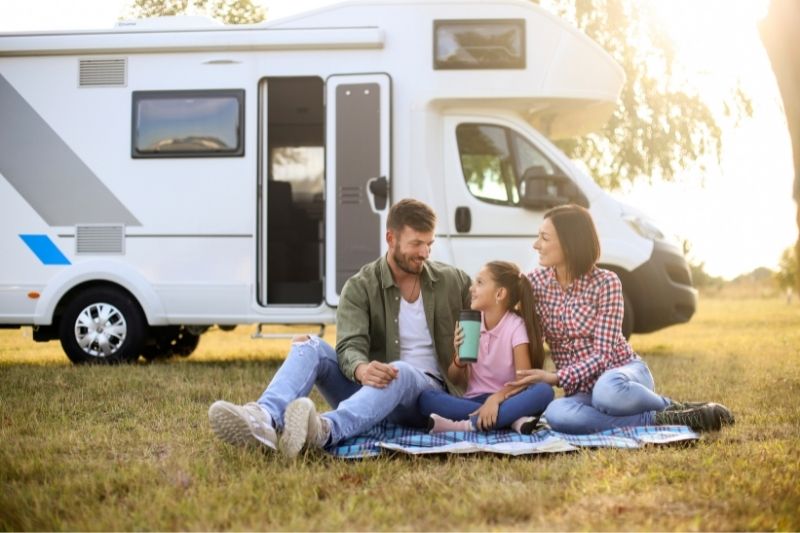
Yes, RV sharing can be incredibly profitable. Compared to making $0 with your RV, even renting your RV out for one weekend a year can be profitable.
The specific amount of money you can make renting out your own RV depends on a few factors. They are:
- The age of your RV.
- Your RV type.
- The condition of your RV.
- Your RV’s location.
- How often your RV is available for rental.
RVShare says that their owners easily earn between $10,000 to $60,000 a year (or more) in extra income by renting out their RVs. That’s between $833 and $5,000 per month!
Here are some estimates directly from RVShare themselves. Based on your RV type, this is how much you could earn per year:
| RV Type | Earnings/Year |
|---|---|
| Class A Motorhome | $60k/yr |
| Class B Motorhome | $30k/yr |
| Class C Motorhome | $38k/yr |
| Fifth Wheel | $22k/yr |
| Travel Trailer | $22k/yr |
| Pop Up Camper | $22k/yr |
Find out how much you can make listing your RV on RVShare here.
How to Rent Out Your RV With RVShare In 9 Easy Steps
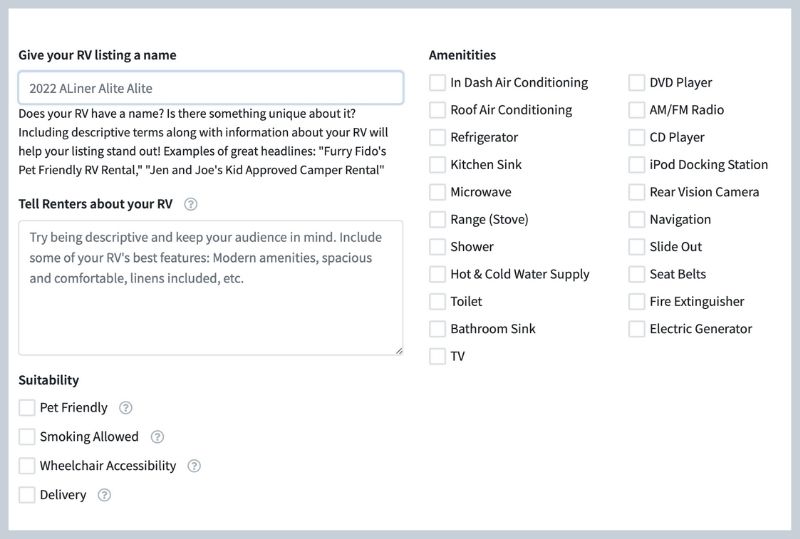
Here’s how easy it is to rent out your RV on RVShare.
- Sign up to list your RV on RVShare here.
- Enter your RV location information.
- Enter your RV model and insurance information.
- Create your listing by writing a title, description, and selecting amenities.
- Set your pricing.
- Add photos of your RV.
- Add your own profile photo.
- Write a short bio about yourself.
- Set up payment information.
RVShare will help you make the most out of your listing with prompts and options to enhance your description as you go through the signup process.
Additionally, the platform gives you pricing suggestions to help you earn the most profit possible from your RV. Although they give you pricing suggestions, you can raise or lower the pricing.
In your RVShare owner dashboard, you have access to your message inbox, a calendar with reservations, the ability to view and edit your listing, and a metrics section.
The metrics section tells you important information that provides valuable insights to help you improve your listing and get more bookings.
It shows you:
- The number of completed bookings.
- Total and average review ratings.
- How many people favored your RV listing.
- Your message response time.
- And more.
This is also where you can make your listing active or hidden, depending on your RV’s availability.
Can I Rent Out My RV on My Own Property?
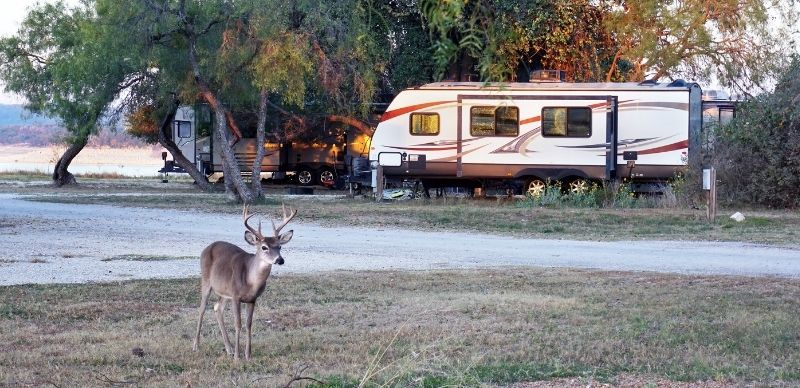
Yes, you can choose to rent your RV out on your own property with RVShare. This option is called Stationary Rental. You can toggle this on or off when you create your RVShare listing.
There are many benefits of offering a stationary rental on RVShare.
For starters, new renters who feel worried about a stranger driving or towing their RV can still make money by renting it in a stationary location.
Your RV should be parked, set up, hooked up, and ready to be used as a stationary rental option.
It can be located anywhere you’re allowed to park it, such as your own home property or a permanent campsite.
This is a great option to make money if your RV is parked permanently at a year-round campground.
What Kind of People Choose Stationary RV Rentals?
If you’re wondering what kind of travelers would choose this option, you might be surprised.
Stationary rentals are great for vacationers who want to experience RV life without the travel aspect.
Additionally, it can be an attractive option for those in town, on business, visiting family, or locals looking for a unique staycation.
Finally, stationary RV rentals are a great choice for travelers looking for last-minute accommodations.
Pros and Cons of RVShare

Let’s take a look at the pros and cons of listing your RV with RVShare.
Pro 1: Great Way to Make Money
First, renting out your RV is an excellent way to make money. Not only can renting your RV offset the costs of ownership, but it can also be profitable.
Many of us have RVs that we only use part of the year. The problem is: you have to pay for it year round.
When your RV is sitting in storage or in the driveway, it’s not doing anything other than costing you money.
Renting it out is a great way to ensure your RV is getting used and the systems are exercised. Plus, it’s a great way to make your RV pay for itself.
Pro 2: You Have Full Control
As an owner on RVShare, you have full control of your rental. You set the price, decide how the rental works, and more.
If you don’t want a stranger driving or towing your RV, you don’t have to allow it. You can choose to deliver and set up the RV for your renters. This has two benefits: it provides peace of mind and allows you to charge extra for delivery.
Additionally, you can rent your RV in a stationary location, like at your home property or a permanent campsite.
Con 1: Profitability Varies
Your RV’s profitability will vary widely depending on factors like your RV type, age, and location.
If you live out in the boonies or far from a travel hotspot, you might not receive as many bookings as if you were in a bigger tourist destination.
However, even just one booking a year is more profitable than not renting your RV out at all.
Con 2: Wear and Tear
Let’s face it: renting out your RV to strangers causes more wear and tear on your RV than having it sitting in storage.
And to be totally honest, not all renters will have your RV’s best interests in mind.
This is a factor that you will have to weigh with the pros of renting the RV. On the one hand, your RV needs to be used to make sure all the systems stay in good working order.
On the other hand, you may experience a renter who doesn’t take care of your RV as meticulously as you would.
Only you can decide if the profit and tradeoff are worth it in this case.
Is It Worth It To Rent Out Your RV?
If making extra money with your RV that would normally be sitting unused sounds appealing to you, then it’s worth it to rent out your RV.
However, there are pros and cons to renting out your RV. On the one hand, your RV will be earning money instead of just costing money. On the other hand, it will be exposed to more wear and tear than sitting in storage.
For many people, this tradeoff is definitely worth it.
If you decide to try renting your RV, we recommend giving RVShare a try. It’s the largest peer-to-peer RV rental marketplace online, with plenty of resources for owners and renters alike.
Not sure if it’s right for you yet? Head to RVShare and browse RVs like yours near you. See what they’re making per night and if that gives you some inspiration.
1. Make Money by Renting Out Your RV
2. The Ultimate Guide to Renting Out Your RV
3. 4 Best RV Rental Companies: Pros, Cons, and Prices
4. I Rent My RV On My Own Property?
5. 21 Essential Tips for First Time RV Renters
About the Author
Carrie Wilder is a part-time van lifer, full-time nomadic lifestyle enthusiast, and the advertising and SEO Manager at Escapees RV Club.
When she’s not camping or working, you can find her writing about her favorite marketing tips on her website, The World Wild Web, or befriending the nearest cat.



I think it depends on the RV and the person using it. Some RVs are very small and can be parked in a small space, while others are very large and require a lot of space. It also depends on the type of camping